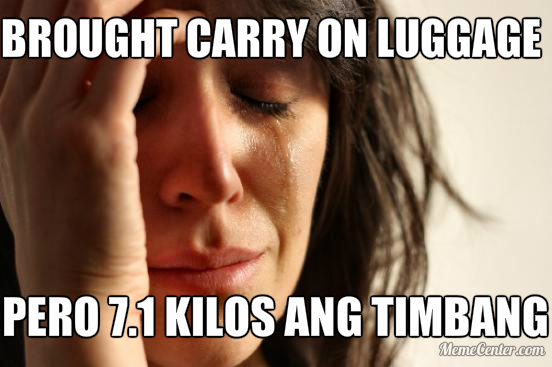Whether it’s going back to your hometown after exhausting yourself from work or studying away from home, or maybe going to your destination of choice for a vacation, or simply venturing out to uncharted territories for the heck of it, we Filipinos have always made sure to never let a year pass without being able to travel.
In a report by abs-cbnnews.com, Tourism Secretary Ramon Jimenez said that traveling has now become part of the Filipino lifestyle, claiming that the “average lower to upper-middle income Filipino home now counts a vacation away from Manila as standard.”
As the clamor for travelling increases, the traffic and actual consumer market for air, sea, and land travel also increases. This carries with it the possibility of a travel crisis to be highly likely.
It’s the unexpected encounters and circumstances that go with it that make travelling even more interesting and pleasurable. However, some of these unforeseen situations may become stressful crises.
Some of the most common unintended travel blunders include delayed flights or boat trips, stolen belongings, fatigue from long trips, and additional expenses beyond the projected budget. Here are a few tips that could help you endure and, more importantly, pre-empt these situations and lessen the gravity of the potential disasters.
Double-check your travel schedule.
It’s imperative that every passenger knows their travel time and date. Some, especially veteran travelers, would even rely on just a quick glance at their tickets. However, it always pays to double-check.

“Yung travel sked mo, lagay mo dito.” | Meme by Val Amiel Vestil via MemeCenter.com
Wendell Gallofin, a Sillimanian sophomore from Cagayan de Oro, missed his flight because he thought he was scheduled to leave the day after. “Bugoka nako ato, maong karon gabalik-balikon najud nako ug tan-aw akong ticket (I felt so stupid. That’s why now, I always take a second look at my ticket).”
Taking a look at your booked trips also allows you to determine whether or not the trip has been delayed or cancelled. Normally, for flight reservations, airlines email passengers about delays. For boat trips, you can always call the ticket outlet where you bought your ticket.
A delayed flight or a cancelled boat trip due to system or weather disturbances is something that is beyond any passenger’s control. The Bureau of Transportation Statistics states that 42.1 percent of the delays in 2013 were caused by aircraft arriving late due to circumstances within the airline’s control. However, the issues you have when this happens can be managed if you are aware beforehand that there will be a delay.
When you are conscious about a change in schedule, you then have enough time to adjust your plans and connecting trips. You can notify your friends or family members who are affected by this change (e.g., those who will pick you up), as well as deal with hotel reservations.
Travel light.
This is the cardinal rule of traveling that has been repeated in an travel guides of all sorts. Traveling light can help you immensely when faced with problems. Packing light allows you to have a free hand when you most likely need it, and can help you move more quickly. When you have just one piece of luggage compared to five, you only need to focus your attention on that one item, which lessens the chances of it being lost, or worse, stolen.

“Brought carry on luggage, pero 7.1 kilos ang timbang.” | Meme by Val Amiel Vestil via MemeCenter.com
One of the biggest inconveniences during airline travel is being stopped at the counter for excess luggage. Either you have to pay a lot for the excess or you need to find someplace in the airport to remove things from your luggage.
That’s why it’s always best to pack light. But what does packing light really look like?
If you didn’t purchase any allowances for check-in and are faced with the task of keeping your luggage below the maximum of 7kg, luggage that is 1.5’ by 2.3’ would be best. Counters don’t necessarily weigh your luggage when it’s a carry-on item, but it should not look bloated. One tip you need to remember when packing for carry-on luggage: if your bag looks like it will not fit in the overhead bin, then chances are you’ll be staying in the airport for a longer time.
Find a travel companion.
Summer, start of classes and holidays are peak seasons for travel, and most likely you’ll have a friend with the exact same date and time of travel as you. It is best then that you ask that person to be your travel buddy. The biggest advantage when travelling with a companion, especially when faced with a temporary setback such as an unexpected rebooking of a flight, is the option of splitting expenses. These could include taxi fares to the nearest hotels to stay in for the night, and even splitting the hotel room expense.

“Wala kang travel buddy? Nganga!” | Meme by Val Amiel Vestil via MemeCenter.com
“The expenses were cut to more than 50%,” Ela de Barras, a frequent traveler, said after being forced to stay in Cebu City overnight because of her flight that had been rebooked the following day. “And that was a good thing kay wala man mi ka andam ug kwarta para pang hotel (because we weren’t able to prepare money for a hotel accommodation)! We even combined our 7-kilo maximum so that we would not pay half as much of the original excess luggage fee.”
Another plus of traveling with a friend is that their presence will keep you sane so as not to lash out at airline staff about delayed or cancelled trips. According to Remy Lo of USA Today, it’s best to “keep yourself busy to avoid getting restless or angry” by conversing with other passengers.
Keep all your electronics juiced.
The worst case that could ever happen to you is for your cellphone’s or laptop’s batteries to be drained when you need it the most: moments when you need to call your friends or relatives about flight cancellations or emergencies, or moments when you get lost in a city or don’t have a place to stay in for the night.

“Unli call nga, empty bat naman.” | Meme by Val Amiel Vestil via MemeCenter.com
Carlos Alcos of the Matador Network, an independent media company and nexus of travel culture, shared on CNN the initials ABC: Always Be Charging. “Whenever you can, plug those electronics in and keep those batteries juiced.” He also advises travellers to “make sure your electronics meet the electricity standards of your destination.”
Make sure you’re stocked with money…
…both on hand and in your ATM account. You can never be sure about the amount of money you need to be able to get through a flight, especially a flight that has been delayed or rebooked. You need to have a sufficient amount of money in your wallet so as not to avoid delays when checking in. Be careful not to splurge on terminal food and beverages as they cost twice or even thrice the usual amount. You need to save up money for emergency accommodations and fares.

“One does not simply travel with an empty wallet.” | Meme by Val Amiel Vestil via MemeCenter.com
Another thing about bringing money is that you need to be very prudent and mindful of your surroundings. Airports aren’t free of snatchers, and the last thing you’d want is an empty or lost wallet. You don’t need to put all your money in one place. You can always disperse them in unexpected places like coin pockets in your jeans and elsewhere. This way, if thievery does happen to you, you do not lose all the money you have.
You should always have enough to call a friend for help. Also, check in on your relatives at home from time to time. Alcos says, “It’s a good idea for someone to always know where your next movements are, just in case.”
Check ahead to see if you have a friend or relative in the places you are travelling to.
When faced with a crisis, you really cannot expect the biggest help from your loved ones back at home as they can only do so much. Say you have a connecting flight to Cagayan de Oro via Manila, and you’re stuck in Manila for the night because your flight has been pushed to the next day. It saves money if you stay at and get picked up by a good friend or a relative, plus you can always catch up with them.

“Facundo, ipahanda si Tita. Dadaan ako sa bahay nila.” | Meme by Val Amiel Vestil via MemeCenter.com
A simple, “Hey, Tita Jane! I’m going there to Manila on the 20th for a connecting flight. I’m not sure I can get out of the airport but in case you were wondering, I’m just a stone’s throw away!” wouldn’t hurt at all.
Learn about your destination.
A background check on your destination city is a prerequisite for any traveler, whether the city is completely new to your eyes or it’s the town right next yours. You need to know how safe the cities are or how cautious you need to be when in these cities. When doing a background check, you should also have a gauge of how near or far the most inexpensive hotel/hostel to the airport is.

“Pupunta ka ng La Union? Alam mo ba saan yon?” | Meme by Val Amiel Vestil via MemeCenter.com
Keep hydrated.
Nothing is more stressful than missing a trip or having it moved. Stress builds anxiety, anger, and tumultuous activity for the brain that might turn out badly for you. These psychological complications can link to problems such as fatigue and loss of focus. Since the body is composed mainly of water, and vexing situations can use up much of the water our body needs, rehydration helps our bodily systems function at their premier level by striking the balance between the water and the electrolytes our body needs to function.

“Jusko teh. Bilhan mo na lang ako ng mineral water.” | Meme by Val Amiel Vestil via MemeCenter.com
When you are properly hydrated, you lessen your chances of fainting and fatigue during long trips, most especially land trips. Hydration keeps you alert and allows you to have presence of mind to still function properly during tough situations.
These tips, though basic and common, are not the panacea to all travel problems. Travelers should recognize that there are different combinations of disasters one can encounter while travelling. These suggestions, however, cover almost all bases of travelling problems and can be a simple go-to guide for first time travelers who have yet to experience the unfolding beauty of the world.